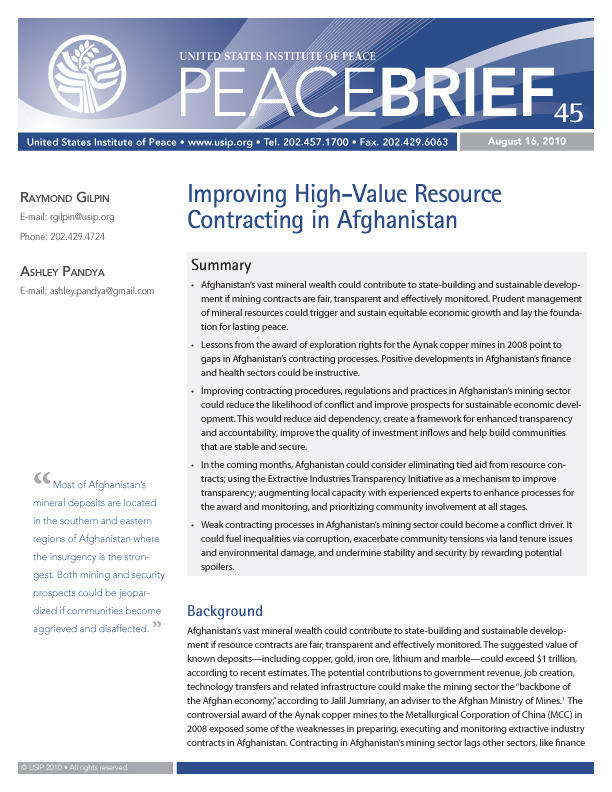Improving High-Value Resource Contracting in Afghanistan
Afghanistan’s vast mineral wealth could contribute to state-building and sustainable development if mining contracts are fair, transparent and effectively monitored. Prudent management of mineral resources could trigger and sustain equitable economic growth and lay the foundation for lasting peace.

Summary
- Afghanistan’s vast mineral wealth could contribute to state-building and sustainable development if mining contracts are fair, transparent and effectively monitored. Prudent management of mineral resources could trigger and sustain equitable economic growth and lay the foundation for lasting peace.
- Lessons from the award of exploration rights for the Aynak copper mines in 2008 point to gaps in Afghanistan’s contracting processes. Positive developments in Afghanistan’s finance and health sectors could be instructive.
- Improving contracting procedures, regulations and practices in Afghanistan’s mining sector could reduce the likelihood of conflict and improve prospects for sustainable economic development. This would reduce aid dependency, create a framework for enhanced transparency and accountability, improve the quality of investment inflows and help build communities that are stable and secure.
- In the coming months, Afghanistan could consider eliminating tied aid from resource contracts; using the Extractive Industries Transparency Initiative as a mechanism to improve transparency; augmenting local capacity with experienced experts to enhance processes for the award and monitoring, and prioritizing community involvement at all stages.
- Weak contracting processes in Afghanistan’s mining sector could become a conflict driver. It could fuel inequalities via corruption, exacerbate community tensions via land tenure issues and environmental damage, and undermine stability and security by rewarding potential spoilers.
About this Brief
The United States Institute of Peace hosted a panel discussion on “High-Value Resource Contracts, Conflict, and Peace in Afghanistan” in Washington, D.C. on July 14, 2010 to examine contracting challenges in Afghanistan’s mining sector and to propose a set of remedial measures. The panelists were: Scott Worden, senior rule of law adviser at the U.S. Institute of Peace; Graciana del Castillo, senior research scholar at Columbia University and author of “Rebuilding War-Torn States”; and James Yeager, former adviser to Afghanistan’s Ministry of Mines and author of “The Aynak Copper Tender: Implications for Afghanistan and the West.” Raymond Gilpin, associate vice president of USIP’s Sustainable Economies program, moderated the event. This report does not necessarily represent the views of the panelists or USIP.



